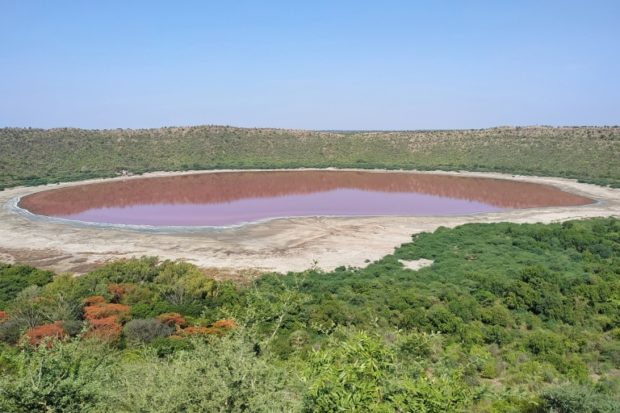Pretty in pink: India crater lake changes color overnight

A general view of Lonar crater sanctuary lake is pictured in Buldhana district of Maharashtra state on June 11, 2020. The lake has turned pink in color which is believed that when the water level goes down, the salinity increases and warm water gives a rise to algae that tends to absorb sunlight and changes the color of the water, local media reported. Image: AFP/Santosh Jadhav
A crater lake in India’s western Maharashtra state has turned pink overnight, delighting nature enthusiasts and surprising experts who attributed it to changing salinity levels and the presence of algae in the water.
Lonar lake, formed some 50,000 years after a meteorite crashed into Earth, is located 500 kilometers (310 miles) from India’s financial capital Mumbai and is a popular hotspot for tourists and environmentalists.
As photos of the lake’s new flamingo-hued waters began to circulate on social media, experts said that although Lonar had changed color in the past, the transformation had never been so sharp before.
“Salinity in the lake has increased as water level has gone down drastically this year and it has become warmer too resulting in overgrowth of algae,” geologist Gajanan Kharat said in a video posted by the state-run Maharashtra Tourism Development Corporation on Twitter.
“This algae turns reddish in warmer temperatures and hence the lake turned pink overnight,” Kharat explained.
Officials from the state’s forest department have collected water samples to determine the exact cause behind the shift, experts said.
With factories and offices shuttered for months due to the lockdown, which only began to ease this week, blue skies have returned to India’s polluted cities, sparking speculation that the restrictions may have also had an impact on the lake.
“There wasn’t much human activity due to lockdown which could also have accelerated the change,” said Madan Suryavashi, head of the geography department at Maharashtra’s Babasaheb Ambedkar University. “But we will only know the exact causes once our scientific analysis is complete in a few days.” JB
RELATED STORIES:
Nature takes back world’s empty city streets
Machu Picchu to sharply limit visits after July reopening in Peru